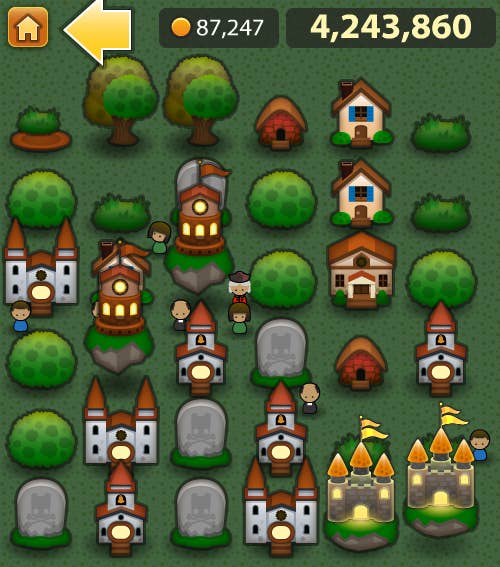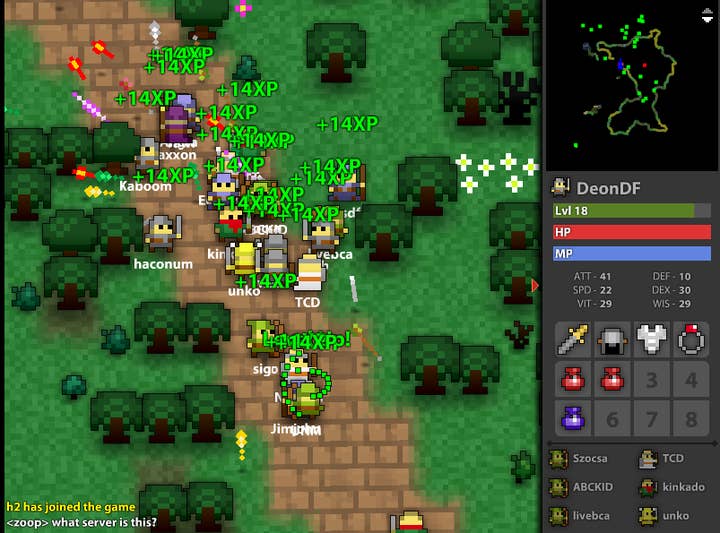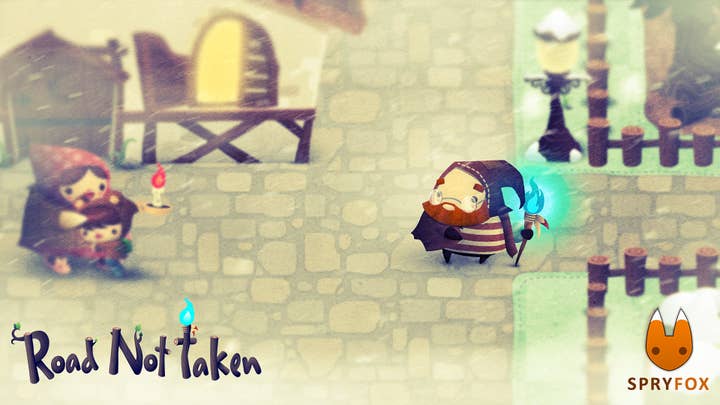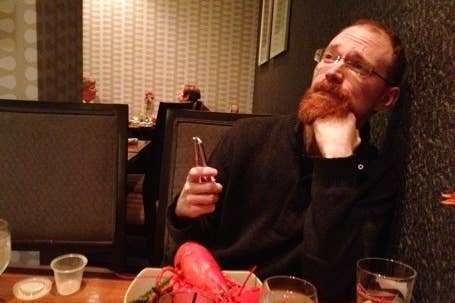Thunder Bunnies and the Social Contract
Dan Cook on why community can be more important than content to online games
I'm looking a stranger dead in the eye, already an uncomfortable situation for an Englishman more used to returning the non-judgemental gaze of a monitor, but even more so here in a vast hall full of hundreds of people. I take a breath, gird myself, and make my admission.
"I am a Thunder Bunny."
It's not something you expect to find yourself saying to a complete stranger in the middle of academic lecture at GDC, yet here I am, doing just that. My neighbour, a few moments later, turns back to me, looks me deep in the eye and clearly speaks his response. "I too, am a Thunder Bunny." The release of tension is palpable.
We're sat, we two Thunder Bunnies, in a session hosted by Spry Fox's Dan Cook, a game designer and academic with a little of the satyr about him. His presentation on emergent governance in social games has been an argument for the use of social systems rather than content as a method of extending lifespan. With the mutual embarrassment of the Thunder Bunny experiment he's been demonstrating how to overcome the risks inherent to the inauguration of any new social relationship: risks of rejection, risks of ridicule and risk to reputation. By taking these risks, by making this admission to our neighbours and erstwhile strangers, Cook's audience is engaging in the creation of the social capital which hums at the heart of any micro-civilization.
"If you structure your game in a way so that people feel the same, people identify with one another. Journey is actually a great example of this in that you all look exactly the same. 'Hey, there's another person just like me"
"Some of the things that help build community are similarities," he explains to me two days later, when we're sat outside the conference hall in the California sunshine and Thunder Bunnies seem very far away. "If you structure your game in a way so that people feel the same, people identify with one another. Journey is actually a great example of this in that you all look exactly the same. 'Hey, there's another person just like me.' That similarity is true even though people come from radically diverse backgrounds, if everyone looks like a person in a cloak you have this natural similarity that ends up being formed.
"The other big one is putting people together, like having people having to run into each other on a regular basis. You see that at GDC here all the time. Well, we look vaguely like one another. A lot of people have glasses. Then we happen to run into each other on a regular basis, and those are the basics of easily forming a relationship. Games that make people feel different and don't give the people an opportunity to bump into each other regularly, and don't let them communicate and share who they are and what they believe in, those games tend to suffer more when the player's asked, 'Hey, you, work together.' It's like, 'No, I don't want to. That's too costly.'"
To very roughly summarise his research-dense speech, Cook's theory is that adding new content to an online game to keep people engaged is a plan with diminishing returns. Unless you're willing to change the structure of the experience radically, at which point you may as well make a new game, you can only really ever offer players variations on a theme with new content. As brilliant as that content may be, eventually people begin to find it samey and lose interest. If you instead replace or augment that content with the ability to participate in socially meaningful interaction, your audience becomes much more engaged, with the social aspects evolving into a sort of endless metagame.

"What I was really fascinated with was the idea that you see the small set of rules, and then the players come and they start glomming onto that and making up their own games, and they start experimenting and playing, then they start having to work together. Because they're working together, suddenly they have to negotiate with one another and come up with rules on top of this whole system that you built, in order to work together with each other and figure out, 'How do we do this well?' and 'How do we do this efficiently?' Then from that comes politics and legislation, like 'How do you make these rules?'
"A lot of this is informal at first, sometimes it's the person with the big stick or the person with the most money or the person with the most time ends up deciding, 'I'm the guild leader.' But often it's this very messy negotiation of this new society on top of your game. I look at that and I'm like, I've historically been making lots of content. I sell content and then people consume content, but this style of dynamic where people are creating societies is a very different thing. They're generating the value. I'm almost tilling a garden and planting a few seeds and they're growing an entire forest on top of that."
It's a phenomenon which has become a staple for many online titles, from the tense, hair-trigger negotiations of DayZ and Rust to the Byzantine corporate intrigue of Eve. Even games like Call of Duty and Battlefield, more renowned for acts of anti-social behaviour than co-operative harmony, have their own emergent systems - server rules like the banning of C4 or grenade launchers. Even the most anarchic of communities evolve rulesets, it seems.
"As a designer, you have to ask yourself the question. 'Is that random chance, or is that something that's reproducible?' And if it's reproducible, how can we use that in interesting ways as a design tool within our games?
"As a designer, you have to ask yourself the question. 'Is that random chance, or is that something that's reproducible?'"
"In circuit design, for years, electrical engineers have been trying to figure out ways of isolating and dampening quantum effects. We want this thing to work in this rigid binary fashion, and anytime we make these things too small, these quantum effects wash over them and it gets all noisy and messy and the entire thing doesn't work. It's a horrible, horrible thing. So we make everything clean and precise. Then they're starting to figure out, Wait, we can actually use those. That messiness, and those awkward things are a fundamental part of physics, a fundamental part of nature, they can actually make circuits that are dramatically more efficient than our rigid binary way of looking at the world.
"The same thing almost happens in games. We have this reductionist thing. There's a player and he has to do these operations and he's going to go down this path. If he's any way messy or gets angry or gets upset, then that's a bad thing. We should shut that down and prevent that from happening. Then you see the games that allow that, they suddenly turn into these massively chaotic complex emergent systems. Maybe there's value in that."
The conversation quickly turns back to Eve. For that game in particular, where every company secretary or fleet treasurer could be an agent of a rival corporation, ready to drop your defences and signal a sudden and very violent influx of enemy capital ships, trust and communication is absolutely key. These guidelines, these levels of trust and social contract, may have ended up influencing the actions of internet spacefleets, but they've been around since the earliest days of human co-operation.
The basics have been enshrined in our most ancient rulesets, I muse to Cook - reflected in systems as diverse as Go, the Olympics and the Ten Commandments.

"They were about society," he replies. "Many of those early games, there's evidence that they were, when people were throwing knucklebones and stuff to predict fate, they were a centerpiece of society. They were almost a religious aspect of society. Society looked for meanings within games, and the games ended up being, the culture ended up growing atop the games."
For ancient humans, I argue, that embodiment of chaos and unpredictability was a magical thing - messages from the gods made tangible, but also potentially indicative of the hostile nature of the universe. In the face of these seemingly arbitrary and uncaring decisions, Man had to band together, to compromise to conquer. Out of chaos was born unity.
Essentially I'm very clumsily comparing the formation of civilisation as we know it to a late-game MMO dungeon raid, but Cook is charitable enough to allow it. I remind him of a line he used in his presentation, that the designer just provides the universal physics of a system, then players evolve the ecosystem, how that could be interpreted as something of a god complex. Naturally, we then move on to talk a little about Peter Molyneux (after whom Cook has named his cat) - about the systems in Black and White - the indirect control which he's echoing today in Godus.
"To a degree it reminds me of game design as a whole because you're building these systems, and you don't have direct control over the players. Anyone sitting through a play test can tell you that you have no direct control over players, even though you may try and hope. Instead, you're building this probability sphere of behaviours and you hope that the players will fit in there and not go too crazy outside the bounds. But then you also hope that some of them will do crazy things that will actually make more play for everybody else."
"if you just let people do anything, then they'll do a lot of horrible stuff, and some of these things can devolve"
To allow for genius, you have to allow for madness then, a line which social philosophers have been trotting out for centuries. A cast-iron grip on proceedings might stop things from deviating from the norm, but what you're left with is just that: repetitive normality, something players get quickly bored of. There is, says Cook, an absolutely vital distinction between governance and Government: where governance represents a malleable and evolving set of social mores which have emerged from a ruleset, and Government is an imposed mechanism which enforces rules, often to the detriment of enjoyment.
"Official rules, where the developer's setting the rules, are something that can be oppressive, so a lot of has to do with the establishment of positive socials norms. But if you just let people do anything, then they'll do a lot of horrible stuff, and some of these things can devolve. So it ends up being very tricky. You want to encourage heavily pro-social behaviours. Things that encourage cooperation. Things that encourage affiliation with each other, and relationship building and trust. You can do this economically. If you add in things that are zero-sum games where there's a resource that people are fighting over - you're actually going to destroy some of those pro-social bonds before they even start to form. But if you go and you make these non-zero-sum elements where everybody benefits if they help each other out, then, at a very fundamental level, you've shifted the tone of the optimal economic behaviour over to this pro-social type activity.

"So there's definitely stuff you can do at the very basic, most basic level possible. However, once you've done that, then another thing happens where the players start creating their own rules and they start actually creating their own type of economic goods. Like, power ends up being this economic good that they abuse. They find that, like in Realm of the Mad God (a browser-based MMO that Cook worked on, which he describes as a social bullet-hell shooter), we had this moment where people found that they could scare off everyone from the drop zone of a particular item, and then that particular item was used to get a very rare good that everyone desired.
"Because they actually had control over that resource, they could leverage that to get other people to make promises to them. They ended up building this power structure where they had all these people who were making promises and they'd say, 'Oh, and if you don't fulfil your promises to us, then we will punish you by not allowing you access to this resource that we control.' So now that's like, even though you set up this nice pro-social foundation and people are generally acting in a pro-social way, people will figure out how to work around that system to gain power and hurt other people. Then at that point, you may have to tune and tweak the rules a little bit to encourage or discourage that specific behaviour."
The wind is picking up in the Yerba Buena gardens now and people are drifting back to the Moscone Centre to catch the last few sessions of GDC. As we move to follow we talk a bit about the highlights of the show and what we've been impressed by, settling on the observation that there are themes which we see emerging here again and again, different aspects of the same vista.
"As game designers, we're running bad code on people's brains and trying to figure out where the bugs are and how it all works."
"I was explaining this to someone who is new to GDC, they were discovering something for the first time," says Cook. "I was saying, 'Essentially what happens is, the game industry doesn't necessarily look outside of itself as much as it possibly could, so they're in this little black box. Every five years, we burn everyone in the black box. Then we import some new people and they're like, 'Wow, we're discovering all these things new again.'
"I like to think of it as the games that we make, the rules that we make, are essentially code that we're running on this human wetware. The human computer has physics to it. It operates in a particular way. As game designers, we're running bad code on people's brains and trying to figure out where the bugs are and how it all works. If we can run code that suddenly gets millions of people to self-organize into these complex, civilized structures, that's an amazing thing. Let's do more of that."
Now that's what I'd call a God game.

